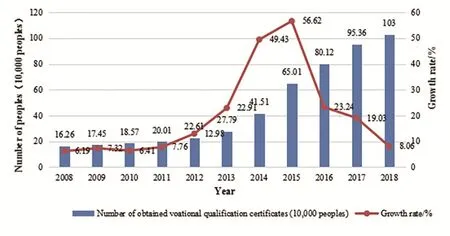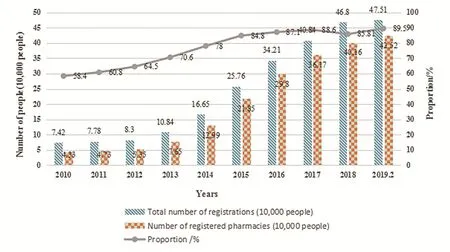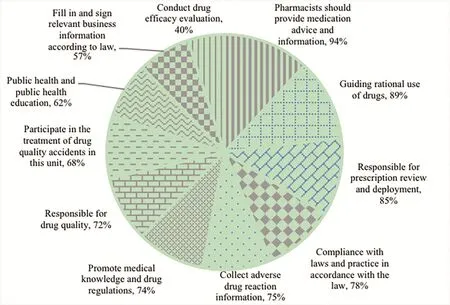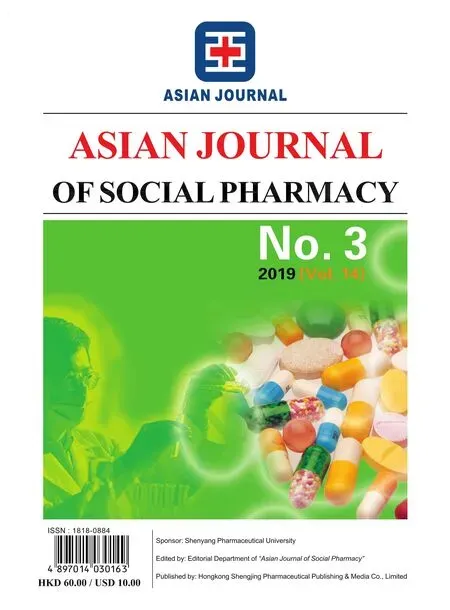Licensed Pharmacists in Pharmaceutical Retail Enterprises in China:Problems and Countermeasures
* Corresponding author: Wang Shuling, associate professor. Major research area: pharmacy management and drug supply chain management. Tel:024-23986543, E-mail: lingyi50@163.com.
Abstract Objective To analyze the status and problems of licensed pharmacists in pharmaceutical retail enterprises in China, and to put forward suggestions for improving licensed pharmacists’ abilities. Methods Literature review and questionnaire survey were used to analyze the basic status of licensed pharmacists in pharmaceutical retail enterprises and fishbone diagram was used to find out the problems. Results and Conclusion Pharmaceutical retail enterprises have the following problems when they employ pharmacists, such as lack of assessment system,too general incentive policies. The causes of problems lie in four aspects, including system, environment,pharmacy and pharmacists. As to the above problems, the government should make policies to encourage and regulate enterprises to explore remote prescription service through Internet. Furthermore, pharmaceutical retail enterprises can take the advantage of Internet to develop a comprehensive performance appraisal system for licensed pharmacists. The assessment information platform will reflect the true level of pharmacists and enhance their professional value.
Keywords: pharmaceutical retailer; licensed pharmacist; performance; fishbone diagram
Under the background of building a well-off society, China’s medical reform continues to advance,including pharmacy classification management, starrated pharmacies, and designated medical insurance pharmacies. Meanwhile, the number of licensed pharmacists related to public health is more than one million. Therefore, the function of licensed pharmacists is constantly attracting social attention.Based on the literature review and questionnaire survey data, the status quo and problems of licensed pharmacists in drug retail enterprises was analyzed.Through the fishbone diagram, the true causes of the problems were found out, and some suggestions were provided for the healthy development of pharmaceutical retailers and pharmacists.
1 Connotation of pharmaceutical retail enterprises and licensed pharmacists
1.1 The connotation of pharmaceutical retail enterprises
Drug retail enterprises refer to retail drug stores,including single pharmacies and chain pharmacies.Retail pharmacies are the common name for pharmaceutical retailers[1]. According to Article 77 of Chapter 10 of the Regulations for the Implementation of the Drug Administration Law, a pharmaceutical retail enterprise refers to an enterprise that directly sells purchased drugs to customers. In 2017, the State Council’s 13th Five-Year National Drug Safety Plan required that the chief managers of all drug retail enterprises should have the qualifications of licensed pharmacists by 2020, and the licensed pharmacists should guide the rational use of drugs during business hours. In March 2019, China Food and Drug Administration issued the Professional Qualification System Regulations for Licensed Pharmacists which stipulated that drug retail enterprises should display the certificate of registration of licensed pharmacists in a conspicuous position. At the same time, licensed pharmacists should carry their licensed card while working. When a licensed pharmacist is absent from work, prescription drugs and Class A over-the-counter drugs should not be sold in the pharmacies.
These policies are necessary for the operation of pharmaceutical retail enterprises, and they are the foundation for licensed pharmacists to be employed by pharmaceutical retailers. Therefore, drug retailers,while meeting the supply of drugs, should ensure the safety and effectiveness of drugs for customers.
1.2 The meaning and registration scope of licensed pharmacists
In 1999, the Provisional Regulations on the Qualification System for Licensed Pharmacists stated that licensed pharmacists referred to pharmacy technicians who had passed the national unified examination, obtaining the qualification certificates to practice in the production, operation and use of drugs. On March 20, 2019, the Regulations on the Professional Qualification System for Licensed Pharmacists was issued by China Food and Drug Administration which added other units providing pharmacy services should have professional qualification certificate for licensed pharmacists instead of pharmacist qualification certificate.
1.3 Changes in duties of licensed pharmacists
The duties of licensed pharmacists have undergone many improvements. First of all, it originated from the Interim Provisions on the Qualification System for Licensed Pharmacists issued by the Ministry of Personnel and the State Drug Administration in 1999. The provisions stated that pharmacists should be responsible for the quality of medicines and ensure the safety and effectiveness of people’s medications. They must work according to the Drug Administration Law and relevant regulations and policies. Besides, they should be responsible for the supervision and management of drug quality within the scope of practice, including the review and supervision of prescriptions, providing medication consultation and information, guiding rational drug use, conducting drug treatment monitoring and evaluation of drug efficacy. In 2016, the Good Supply Practice (GSP) further emphasized that pharmaceutical retailers must employ licensed pharmacists who should be responsible for prescription review and guidance of rational use of drugs. In March 2017,the Code of Practice for Licensed Pharmacists was formulated, which stated that licensed pharmacists should be responsible for prescription adjustment,medication guidance, drug treatment management,adverse drug reaction monitoring, and health education. Finally, in March 2019, the Professional Qualifications System for Licensed Pharmacists revised part of the interim provisions of 1999. It stipulated that licensed pharmacists should abide by the standards of practice and business norms instead of abiding by professional ethics and loyalty, but other duties remained unchanged.
1.4 The application of licensed pharmacists
The broad sense of application refers to the service of personnel, utensils, funds provided for a certain purpose. In a narrow sense, the application of licensed pharmacists in pharmaceutical enterprises refers to employing licensed pharmacists for different positions in accordance with relevant regulations.Licensed pharmacists are employed by pharmaceutical retailers in different positions on a full-time or parttime basis.
2 Current situations of licensed pharmacists in China’s pharmaceutical retail enterprises
2.1 The overall status of the licensed pharmacist team
The system of licensed pharmacist in China started in 1994. As shown in Fig. 1, the number of licensed pharmacists rose from 162,600 in 2008 to 1.03 million in 2018, 6.3 times in 10 years. The fluctuation showed the growth rate increased year by year from 2008 to 2015. It reached a peak of 56.62%in 2015, and has been in a downward trend since then. However, under the guidance of the national policy, the number of people obtaining professional qualification certificates has been increasing year by year. It can be seen that the number of licensed pharmacists in China continues to grow. By of the end of February 2019, the number of licensed pharmacists in China was 475,073, and the licensed pharmacists who registered in pharmacies were 425,212, accounting for 89.4% of the total number of registrations. As shown in Fig. 2, the number and proportion of licensed pharmacists registered in retail pharmacies shows a steady upward trend. It can be seen that most of the registered licensed pharmacists are employed by pharmaceutical retailers.

Fig. 1 Number of people obtaining professional qualification certificates in 2008-2018

Fig. 2 Number of registered pharmacies of retail pharmacies in February 2010-2019
At present, there are great differences in the positions of licensed pharmacist hired by pharmaceutical retailers. Most enterprises set up professional positions for licensed pharmacists who are responsible for prescription allocation, medication consultation, and guiding customers to use drugs rationally in the drug stores. Other enterprises assign licensed pharmacists to the drug quality post in the headquarters to be responsible for the work related to drug quality[2]. Some pharmacists are responsible for monitoring drug adverse reaction and evaluation. Other licensed pharmacists are arranged in management positions such as store managers to fulfill some of the duties of pharmacists[3]. In June 2016, a survey was conducted by a research team in 31 provinces on the Cognition of Social Roles of Licensed Pharmacists, 4265 valid questionnaires(referred to as questionnaire 1) were collected,as shown in Fig. 3. A total of 94% of the public believed that these pharmacists’ responsibilities for pharmaceutical retailers were to provide medication counseling and information. 89% believed that they should give the guidance for rational drug use, and 85% believed that they were responsible for prescription review and allocation. Only 40% thought that they should carry out drug efficacy evaluation.

Fig. 3 Overall investigations of the duties of licensed pharmacists in pharmaceutical retail enterprises
2.2 Current situation of licensed pharmacists in drug retail enterprises
2.2.1 Most licensed pharmacists provide drug counseling and guidance to customers
The number of licensed pharmacists in pharmaceutical retail enterprises is increasing year by year. Most licensed pharmacists in stores not only provide drug sales service, but also are responsible for the guidance of rational drug use, prescription audit and allocation. Meanwhile, they help to analyze the cause of disease for customers and guide customers the time, method, doses and possible adverse reactions and coping methods of taking drugs. Besides, they are careful about the rational drug use for children and the elderly to ensure the safety, effectiveness and economy of medication. In September 2018, the research group conducted an online questionnaire survey on regional economic development and medical treatment (Questionnaire 2). A total of 13,098 valid questionnaires showed that 59.64% of customers went to retail pharmacies to buy medicine according to doctor’s prescription, 79.92% of customers could get guidance from licensed pharmacists while buying medicines. 62.83% of customers could get pharmaceutical service offered by licensed pharmacists, and 44.06% of customers were satisfied with pharmaceutical service from the local pharmacy.The duty of licensed pharmacists is to finish the tasks generated from their specific occupations and positions. As can be seen from the data, the overall situation of licensed pharmacists in drug retail enterprises is optimistic and their performance is good.
2.2.2 Some licensed pharmacists carry out quality supervision in their management positions
Some licensed pharmacists are employed in many positions such as quality, procurement, acceptance,operation, store manager and human resources.Different enterprises have different arrangements for licensed pharmacists. Some licensed pharmacists are fully responsible for quality supervision and management[4]. Some licensed pharmacists have to take other work into account besides their own duties.Of course, the person in charge of the enterprise and the person in charge of quality should have the qualification of licensed pharmacist, whose main responsibilities are to formulate and revise the quality management system of the enterprise and abide by laws and regulations.
Enterprises also assign licensed pharmacists to other positions so that they can inspect drug quality as well. For example, the purchasing personnel must verify the qualification of the wholesale enterprises.The inspector shall check and accept the purchased drugs one by one and put them into the warehouse.Pharmacists in the position of storekeeper should regularly check the temperature and humidity meters in the warehouse and make records. They must take timely measures when the environmental conditions cannot meet the standards. Licensed pharmacists in human resources position should be trained the latest pharmaceutical laws and regulations so as to improve their pharmaceutical service level.Licensed pharmacist who is the store manager should be responsible for the management in the store and improve the customers’ awareness of disease prevention.
2.2.3 Some enterprises only use certificates without employing pharmacists
Some enterprises do not employ licensed pharmacists. To meet the government’s requirement of Good Supply Practice (GSP) certification, they rent licensed pharmacists’ qualification certificates from medical institutions, scientific research institutions and other institutions. This phenomenon is widespread in all regions. There are three reasons for this phenomenon.
Firstly, when a newly established enterprise must have the qualification, the licensed pharmacists shall be employed temporarily who have to be on duty within a certain period of time. Secondly,licensed pharmacist leave enterprise temporary due to personal reasons, the enterprise continues to use his certificate without replacing timely. Therefore,the licensed pharmacist and his certificate are in a state of separation, that is, the qualification certificate and registration certificate are still in the enterprise.Thirdly, some licensed pharmacists have other work,but they put their qualification certificates in the enterprise so that they can get 1000 yuan to 2000 yuan a month. This results in the ghost pharmacists who just offer qualification certificate but not their service. The above three situations means pharmacist’s qualification certificate works, but pharmacist doesn’t participate in the real practice.
3 Analysis of the problems and causes of licensed pharmacists in drug retail enterprises
3.1 Problems of licensed pharmacists in drug retail enterprises
3.1.1 Enterprise has no special assessment system for licensed pharmacists
At present, drug retail enterprises do not have clear working objectives and standards for licensed pharmacists, so they cannot assess the work completion and duty fulfillment of licensed pharmacists properly.Meanwhile, licensed pharmacists do not know their true professional level. There is no special evaluation system for both part-time licensed pharmacists and full-time licensed pharmacists. Therefore, their responsibilities are not clear, and the treatment is not different, which affects their work enthusiasm.Questionnaire 2 shows that 22.94% of customers can buy prescription drugs in drugstores without a doctor’s prescription, 18.12% of customers have received wrong medication guidance from licensed pharmacists,and 30.83% of customers are told to change into highpriced drugs by a licensed pharmacist. Obviously,there are some problems in the process of performing their duties for licensed pharmacists.
3.1.2 Enterprises do not have detailed content in the incentive mode for licensed pharmacists
Incentive system is a process of maximizing employees’ commitment to the organization and work through specific methods and management systems.The purpose of incentive system is to stimulate employees’ correct behavior, arouse their enthusiasm and creativity, and fully realize their potential to make the best performance. Currently, most companies have incentives for licensed pharmacists. For instance,licensed pharmacists with qualification certificate can have 500 yuan to 2000 yuan than those in the same position. At the same time, enterprise will bear the cost of continuing education for licensed pharmacists.However, there is no further detailed assessment for pharmacists’ performance of their duties. The licensed pharmacist can also obtain this incentive if he fails to perform the corresponding duties. In a certain sense, this is only a reward for a licensed pharmacist’s qualification certificate, not for his performance of duty. This also put a proper coat for the use of the professional qualification certificate.
3.1.3 Enterprises use pharmacist’ certificate only
Drug retail enterprises are special because the drugs they sell have both therapeutic effects and adverse reactions. Drug retail enterprises, different from ordinary stores, not only undertake drug sales,but also guide the public to have rational drug use.Some enterprises only consider profit, ignoring the importance of pharmaceutical professional services[5]and social responsibility. In order to solve their business qualification problem, they only rent certificates to reduce operating costs. Meanwhile,some licensed pharmacists can get salary without working. When enterprises don’t fulfill their social responsibility, they will bring hidden drug danger to customer[6].
3.2 Cause analysis of the problems of licensed pharmacists in drug retail enterprises
The problems of licensed pharmacists in drug retail enterprises are not conducive to the healthy development of the licensed pharmacist team. The fishbone diagram is used to analyze the causes from four aspects: system, environment, pharmacy, and pharmacists, as shown in Fig. 4.
3.2.1 The update of pharmacist’s rules and regulations does not match the development of the team
The series of systems and management methods,such as the Interim Provisions on the Licensed Pharmacist Qualification System which had been implemented for 25 years, cannot meet the need of the development of licensed pharmacists in the new environment. Licensed pharmacists always have unified examinations, registration and continuing education and they do not have the adjustment. In particular, their continuing education is not formalized and targeted[7], which is not good for improving pharmacists’ ability. As to the scope of pharmacist’s responsibilities, different positions have no detailed specification for them. If the supervision is not in the place, enterprises and licensed pharmacists will take advantage of the system, and there will be violations such as certificate only. Besides, there are local differences in the supervision level.
3.2.2 Drug retail enterprises take advantage of the system to reduce operating costs
Drug retailers do not pay enough attention to customers’ safety of drug use which should be offered by licensed pharmacists. Some enterprises sell prescription drugs to customers without prescriptions or examinations from licensed pharmacists. In order to reduce operating costs and avoid complicated registration procedures, some enterprises do not employ licensed pharmacists. In order to pass national inspections they just rent certificates or adopt transitional policies, neglecting the potential longterm value brought by licensed pharmacists. They cannot provide customers with satisfactory medication services, which will bring hazards for customers’medications.
3.2.3 Pharmacists have different professional abilities and there should be an evaluation system
The number of licensed pharmacists is constantly expanding, but there is still a gap in realizing the basic requirements for one store, one pharmacist. Besides,it is difficult to ensure that pharmacists provide drug services on a 24/7 basis. Currently, there are several names for pharmacists such as resident pharmacists,trainee pharmacists and assistant pharmacists because of the transitional policies. However, the professional level of pharmacists is uneven, and some pharmacists in the transitional period are not qualified to guide rational drug use and other work. Besides, they do not have motivation to learn. The result of questionnaire 2 shows that some pharmacists have poor social responsibility, and they are easy to be driven by interest.
3.2.4 The idea of attaching importance to doctor but disregarding pharmacists makes licensed pharmacist not to be recognized
China’s pharmaceutical industry started late,the idea of attaching importance to doctor instead of pharmacist is deeply rooted. Therefore, the public does not trust the licensed pharmacists. According to the survey, 37.23% of the customers choose to go to pharmacies to buy medicine when they are sick. Most of the customers choose to go to the hospitals to see doctors and to buy medicines there.They believe that professional doctors can provide safe medication. Most customers have low social recognition of licensed pharmacists[8]. The survey shows that 5.02% of customers do not know there are licensed pharmacists in the pharmacy when they are ill. It means that some customers have no idea about licensed pharmacists.

Fig. 4 Cause analysis of the problems of licensed pharmacists in pharmaceutical retail enterprises
4 Suggestions for improving licensed pharmacists in pharmaceutical retail enterprises in China
4.1 The relevant national policy system should be further refined
It takes 25 years to start the reform of qualification system for licensed pharmacists. It is obvious that the system cannot match the development speed of the team. Therefore, the policy system should be further refined quickly to improve the quality of the large team. First, for the problem that the licensed pharmacist is not enough, the government can take advantage of the Internet platform to guide and promote licensed pharmacists for remote trial and training. Second, as to the assessment of licensed pharmacists’ abilities, the government can introduce a capacity assessment system timely. For example, the licensed pharmacists can be divided into three levels, including primary, intermediate and advanced systems, or five-level management.Third, according to different positions, the content module of continuing education should be refined.Besides, the construction of licensed pharmacist base should start, and a qualification system for continuing education units must be established. Fourth, according to the differences between urban and rural areas and the differences between the eastern and western regions, the examination system or the policy should be differentiated. Fifth, in view of the shortage of the prescription sources for pharmaceutical retail enterprises, the government can effectively link the remote electronic prescriptions of physicians with the prescription review platform for licensed pharmacists to meet public health needs. Sixth, it is also necessary to renew and improve the registration management system.
4.2 Increasing supervision and enforcement
Learning from the experience of developed countries, we can improve laws and regulations based on China’s conditions. The duties and obligations of licensed pharmacists in different positions should be clarified in pharmaceutical retail enterprises. Besides,regulatory measures should be further refined to solve the problem of renting certificates from pharmacists.Once licensed pharmacists are found to rent out their vocational qualification certificates, they cannot register as licensed pharmacists within three years.If they violate twice, they will not practice for 10 years. In addition, they must participate in the training for one year before their registration. Then they can register after passing the examination[9]. Lastly, we must reduce local protection practices in regulation.
4.3 Enterprises should establish a comprehensive performance appraisal system for licensed pharmacists
The Party Central Committee and the State Council attach great importance to relying on the Internet platform to deepen integration of the Internet and various industries in the society. With the help of this favorable policy, pharmaceutical retail enterprises can actively explore online platforms of performance appraisal system, which can truly reflect the professional competence of pharmacists. Performance appraisal is a process, in which the work objectives and performance standards are compared[10]. A scientific appraisal method is adopted to assess the completion of employee’s work and his duty. Then the evaluation results should be informed to employees. The company hopes that each licensed pharmacist can contribute to the goal of the company, which requires an objective and comprehensive performance appraisal for each licensed pharmacist[11]. Drug retail enterprises should not have a general incentive for licensed pharmacists.According to the situation of drug retail enterprises and development characteristics, they can take the advantages of the Internet to set up a pharmacist performance evaluation system. Meanwhile,pharmacists should be given additional income that matches their jobs. Therefore, it is necessary to discard the unspoken rules of income from renting out pharmacist’s qualification certificate. This can improve the enthusiasm of the licensed pharmacists[12].
Drug sales need a specialized team with strict management. Licensed pharmacists are an important guarantee for the professional management of pharmaceuticals because they are crucial to the long-term development of pharmaceutical retailers and customers’ safe drug use. With the promotion of pharmacy classification, prescription outflow and other related policies, the management of licensed pharmacists is vital for the development of pharmaceutical retail enterprises.
- 亚洲社会药学杂志的其它文章
- Information for Authors
- Regulation of Drug Clinical Trials in China: Course and Development Trend
- Pharmacy Service in Private Hospitals: Problems and Countermeasures
- Analysis of the Current Situation of Active Pharmaceutical Ingredient (API) Export in China
- Empirical Study of the Relations between Executive Compensation Gap and R&D Investment in Pharmaceutical Manufacturing Enterprises
- Risk Control Strategy in the Research and Development of Pediatric Drugs

